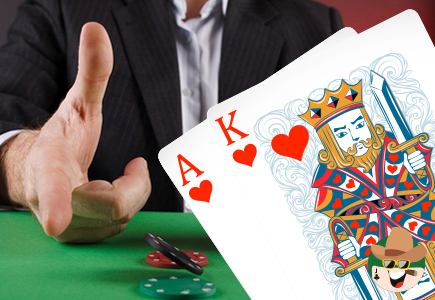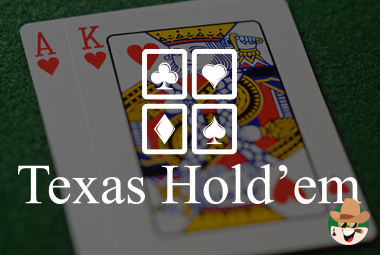
An intriguing email came to me from Wayne R. in Ft. Worth, TX
'Dear Geno,' he writes, 'I have a poker playing buddy who insists that A-K in Texas Hold.em is a better hand than pocket aces or kings. Huh? That doesn't seem to make sense to me. If you could expound on that, it would be greatly appreciated.
'Also, I have started playing poker tournaments on line and want to know your opinion about bluffing and picking up pots. The last couple of sessions have been card-dead for me and I am wondering if there is anything I can do to improve my chances of making that final table. Thanks for our help. Wayne R., Fort Worth, TX.'
My thanks to Wayne for his email. He comes from the state where Texas Hold'em originated and deserves the best expertise I can offer him.
Wayne opened up a big can of worms with his question about A-K vs. pocket aces or kings. I know more than a few players who shudder any time they catch a pair of pocket aces or kings in Hold'em. It doesn't matter if it's a cash game or tournament. They actually cringe at the thought of playing those pocket pairs, especially if it's no-limit.

Now I admit that when I see a large pocket pair in Hold'em, it sets my heart to beat faster. Have I lost with high pocket pairs? Yes, on more than one occasion. But I still would not trade them for any other two cards in the deck.
Still, with the complexity of how Texas Hold'em is structured, there is something to be said for the argument that A-K are superior to these high pairs because of one basic fact. You will typically win a small pot with pocket aces or kings, but you can lose a big pot with these same two pairs. On the other hand, you will lose small pots with A-K, but you can win very large pots with those cards.
The problem, of course, is the flop.
Players are confronted with the question of how much they should raise with those pocket aces or kings. Your raise also depends on your position at the table and whether you are facing a raise when it is your turn to play. An all-in raise is pretty much of a dead giveaway that you are holding a dynamite hand. Let's say you raise the size of the pot with two black aces and the flop comes k-q-9 of hearts. There are three callers to your raise and one of them comes out betting with a caller. What is your next action?
I am waiting.
Brunson suggests you play according to what you know about the player. If he is a fast player who bluffs often, he may be worth a call or even a raise to see where he stands. If he re-raises, you need to fold, no questions asked. If he just calls, he is probably on the draw and your next action will depend on what falls on fourth street.
Raising with A-K is an entirely different thing. Again, the flop matters greatly. If you catch an ace or a king, you are in splendid shape to win the pot since there may be players who call your raise with an ace and a smaller kicker. If the flop comes 2-7-9, it's worth another bet since you have two over cards. Then if a king falls on fourth street, you probably have the best hand. If there is action on the table and someone comes out betting and there is a raise, you could have a problem. But you will usually be in a good position to win the pot with that kind of card on fourth street.
Bluffing and picking up pots is something every player needs to do well in a cash game or tournament, especially if they are not getting good cards. There will be players at your table who will raise and if they miss the flop will check. These are weak players and you need to try to pick up the pot after they fail to bet after the flop. If you come out with a strong bet once they check, you will probably have a winner. If you know the person is a bluffer and the flop is raggedy, a raise may accomplish the same thing.
Being behind the button or one position to the right of the button also gives you the opportunity to steal a pot. Again, you must be observant as to how the player reacts to the flop. Study your opposition. Watch the patterns of play of your foes. When they are passive, you must be aggressive. If they are aggressive and you don't have cards, all you can do is fold.
Sometimes a player must pick up pots to stay in the game when they are card dead. You will need to play position. If you are in the blind or in the first three seats after the blind, you need better cards to call than if you are in seat 7-9. In late position, you can probably call with any two reasonable cards, including 10-8, 9-7, 7-6 or any two cards 10 or higher. Then if a poor flop happens -- a pair and a small card -- and everyone checks, you can come out betting with the expectation of good results.
Another good ploy is to raise blind behind the button when there are late callers. Then regardless of what flops, if the other players check, come out betting. Make another bet on fourth street and you will probably be a winner.
Hopefully, the cards will improve as the game or tournament progresses. This kind of play will throw your opposition off guard since they will not know what you are holding. Remember that a calling station rarely wins and an aggressive player generally ends up in the money.
Study your foes and learn who the good players are. Some of the poor players will call bets with anything resembling a good hand, even a small pair on the flop. These players cannot be bluffed since they will call with anything. Don't try to bluff them. Wait until you have another victim in your sights before pulling the trigger.
I hope this advice helps Wayne. Good luck.
Author: Geno Lawrenzi Jr.
(Geno Lawrenzi Jr. is an international journalist, magazine author and ghostwriter and poker player who lives in Phoenx, AZ. He has published 2,000 articles in 50 magazines and 125 newspapers. If you want to share a gambling story or book idea with him, send an email to glawrenzi@gmail.com ).





